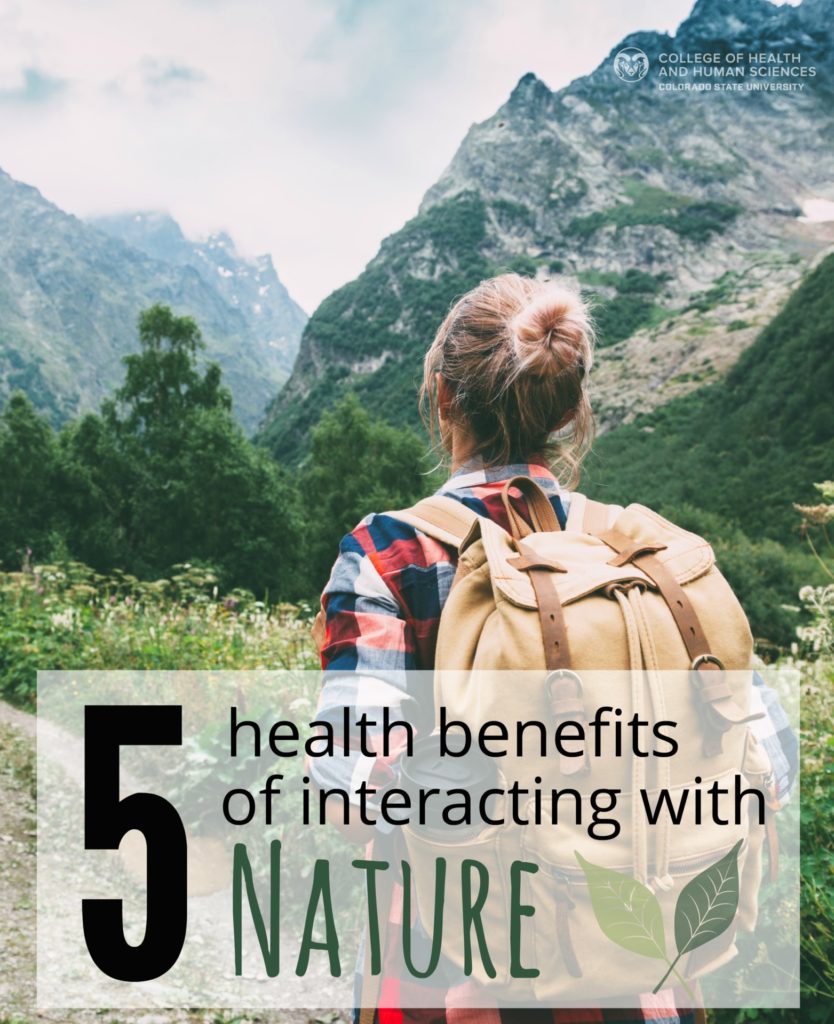The beginning of June in Colorado means the beginning of camping season, boat rides, swimming, and hiking with friends and family. We all know that outdoor summer activities can bring laughter, happiness, and relaxation, but did you know that there is scientific evidence behind the joys of feeling “one with nature?” A plethora of research on the health benefits of nature shows that there are restorative aspects to both being in nature, and being able to view scenes of nature, particularly areas with natural water. Research has shown that people with access to nearby natural settings have been found to be overall healthier than other individuals.
Here are 5 health benefits of interacting with nature:
 1. Nature decreasing stress. Studies have shown that after being exposed to a stressful situation, viewing a nature scene or being in nature can actually help lower the physiological effects of stress such as heart rate, muscle tension, and pulse transit times. Additionally, research in prisons shows that inmates with cell windows with views of the natural world had lower rates of digestive illnesses, headaches, and had fewer sick calls overall. The stress-reducing health benefits of nature also extend to the workplace. Employees with a view of nature perceive lower levels of job stress and higher levels of job satisfaction.
1. Nature decreasing stress. Studies have shown that after being exposed to a stressful situation, viewing a nature scene or being in nature can actually help lower the physiological effects of stress such as heart rate, muscle tension, and pulse transit times. Additionally, research in prisons shows that inmates with cell windows with views of the natural world had lower rates of digestive illnesses, headaches, and had fewer sick calls overall. The stress-reducing health benefits of nature also extend to the workplace. Employees with a view of nature perceive lower levels of job stress and higher levels of job satisfaction.
2. Access to the outdoors makes you feel energized. Research has shown that humans elicit positive psychological responses to nature, which involve feelings of pleasure, sustained attention or interest, feeling a “relaxed wakefulness,” and a decrease of negative emotions such as anger and anxiety. All of these effects can be beneficial in our professional and academic environments, as well as our personal lives.
3. Being in nature can help “clear your head.”
This is a simple way of saying that when a person is exposed to nature, the brain is better able to relieve itself of “excess” circulation (or activity) and nervous system activation is reduced, allowing us to feel relaxed and present. Additionally, experience with nature can help strengthen the activities of the right hemisphere of the brain, and help restore harmony to the brain as a whole.
4. Interactions with nature can help people recover from mental fatigue. After hours of sitting behind a desk or in front of a computer, it can be pretty easy to feel drained and tired. However, research has shown that exposure to nature can help promote a sense of natural fascination and curiosity, which can help increase creativity in a way that feels less like “work.” Furthermore, interactions with nature can help promote a sense of being away from all the chaos of our busy lives. This can help provide a temporary escape from one’s usual setting or situation.
5. Viewing natural scenes has shown increased recovery rates in hospital patients. Studies have shown that being able to views natural scenic areas may actually reduce the physiological effects of stress. Patients in hospitals with access to view natural scenery show increased recovery rates, had better evaluations from nurses, required fewer pain killers, and had less post-operative complications compared to those who viewed urban scenes.
The research promoting the mind-body health benefits of nature is overwhelming and universal, even if it just means being able to view a scene of nature. When given a choice, people prefer natural environments (particularly those with natural water features, large old trees, intact vegetation, or minimal human influence) to urban ones. This summer, grab your friends, your loved ones, or just yourself and enjoy all the outdoor wonders of Colorado! Just don’t forget your SPF!
Maller, C., Townsend, M., Pryor, A., Brown, P., & St Leger, L. (2006). Healthy nature healthy people: “contact with nature” as an upstream health promotion intervention for populations. Health promotion international, 21(1), 45-54.
By Erandi Herndon
Erandi is a Marriage and Family Therapist Intern working towards licensure. She obtained her Bachelor’s degree from the University of Nebraska-Lincoln in Psychology with minors in Spanish and Ethnic Studies. Erandi’s favorite books are the Harry Potter series and she has a new kitten named Oliver. She loves to meet people and help them through their individual journeys.
Colorado State University’s Center for Family and Couple Therapy is affiliated with the MFT Program and provides high-quality therapy services to families, couples, individuals, adolescents, and children. The CFCT offers services to all members of the Larimer County community, as well as to students, faculty, and staff on campus. For more information, see the Center for Family and Couple Therapy website.
For more health tips, visit the College of Health and Human Sciences Pinterest board.